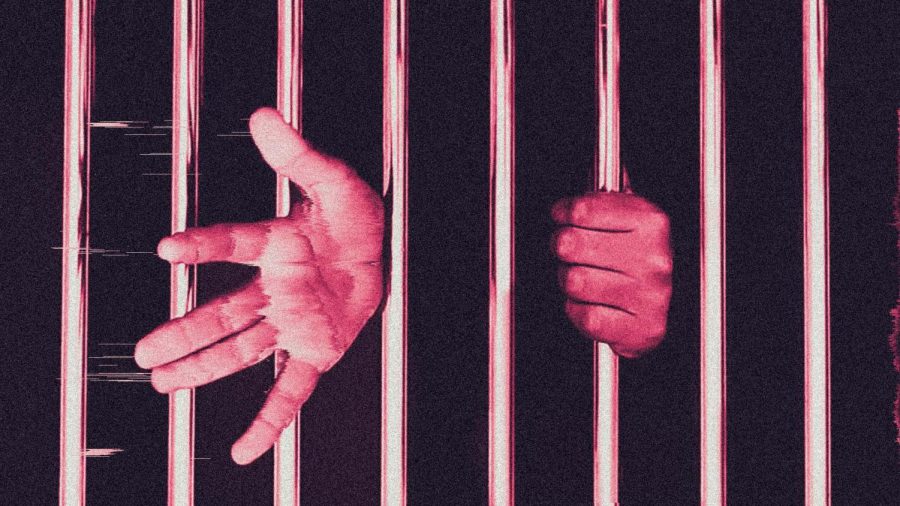Cushman: Rehabilitative Justice Won’t Happen Until We Learn to Forgive
(Graphic by Sydney Stam | The Daily Utah Chronicle)
April 26, 2022
After news broke of a groundbreaking transplant of a pig’s heart into a human body, it was reported that the elderly transplant recipient had a criminal record. Their assault charges from 34 years prior to the transplant became the subsequent headline, demonstrating how our culture latches onto criminality as a permanent mark on someone’s reputation.
This branding of ex-cons as criminals for life seeps into the job and housing markets, education and the right to vote. Until we adopt forgiveness of criminality into our culture, criminal justice reform will remain slow and lack a rehabilitative focus.
Public Opinion of Ex-Convicts
Survey data collected in 2019 and 2020 showed how Americans feel about formerly incarcerated people. Overall, people believe that those with a criminal record should expect less, from owning a car or home to enjoying their job to traveling. Five million formerly incarcerated Americans live in the United States. That’s five million Americans who people believe should limit their goals and dreams.
Included in those millions of Americans are my parents, who are wonderful people who I look up to for their hard work, honesty and parenting. They raised me to work hard and strive for success. They also both spent some time in prison for mistakes they made in their twenties, a piece of information that they long hid from me and don’t talk about — ever.
I think about how hard my parents have worked to have a beautiful home and provide a good life for me. I think about how proud I am of their successes. It breaks my heart that many Americans would want them to expect less than a good life for themselves and their family. My connection to this hostility towards formerly incarcerated people makes this issue personal to me and, simultaneously, makes me hesitant to talk about it.
That same survey also showed that most Americans not only want to limit the aspirations of formerly incarcerated people, but the aspirations of their children as well. Those who thought formerly incarcerated people should expect less were 23% less likely to think that children of former criminals should attend good universities compared to children of non-incarcerated people. Our culture writes off people who have committed crime, almost refusing to acknowledge how much people can change when given an opportunity. It also writes me and many other children off.
The Difficulties of Life after Prison
Our inability to forgive a criminal record even after punishment seeps into the way we treat people when they leave prison. Across the U.S., more than 44,000 statutes and regulations target formerly incarcerated people specifically. Of those rules, 1,300 apply to housing, creating effective legal housing discrimination against people based on criminal records across the country.
Additionally, many employers hesitate to hire people with a criminal record. As a result, 60% of inmates cannot find work within a full year of leaving prison. Writing this piece, I had the opportunity to speak with former Utah inmate Edgar Montero. Montero currently lives in Costa Rica after getting deported from the U.S. upon leaving jail and is familiar with trying to find work after incarceration. Each and every time he has applied to work with a U.S. company, “they check my criminal history in the U.S., and they always deny me.”
Educational barriers for formerly incarcerated people further limit options for success after prison. One report from Georgetown University explains how a lack of prison-based college programs, limited financial aid options and many more restrictions keep higher education largely unavailable to those with a criminal record.
Formerly incarcerated Americans also get excluded from engaging in civic life by a number of laws around the country that exclude people with felonies from voting. This makes it difficult for people with a criminal record to even change the rules that allow for discrimination against them.
The Effects of a Broken System
Sadly, this phenomenon perpetuates criminality. Community support is absolutely essential for rehabilitation after prison. For instance, a formerly incarcerated person who can’t find work within eight months of leaving jail has a 33% chance of going back to jail. That number only goes up the longer they can’t find work, reaching 50% at one year and 70% after three years. A 2020 Marshall Project survey found that most people in prison believed that affordable housing and living wages could have kept them out of jail. Our belief that people with a criminal past should expect less and policies that limit their opportunities only perpetuate a cycle of recidivism.
This focus on recidivism also doesn’t show us how our bias against people with a criminal record affects communities of color, keeps poor people poor and essentially strengthens social divisions. It simply demonstrates that if we do not like crime, the best approach is to give people other options through social opportunity.
We cannot expect people to turn away from crime if we take away all options for survival without crime. And we cannot give them those options until we change the way we view criminality in America. If we truly want rehabilitation and less crime, we need to ask formerly incarcerated people not to expect less, but to expect more.









Mela Tonin • Apr 28, 2022 at 4:11 pm
how trendy. Yeah there should be no consequences for crime. We should just have anarchy. Wait, maybe the stigma of being a LQI (low quality individual) will cause some criminals to pause and consider the consequences before attacking normies.